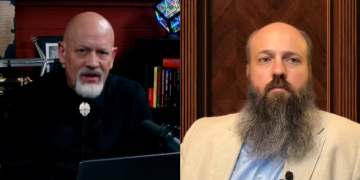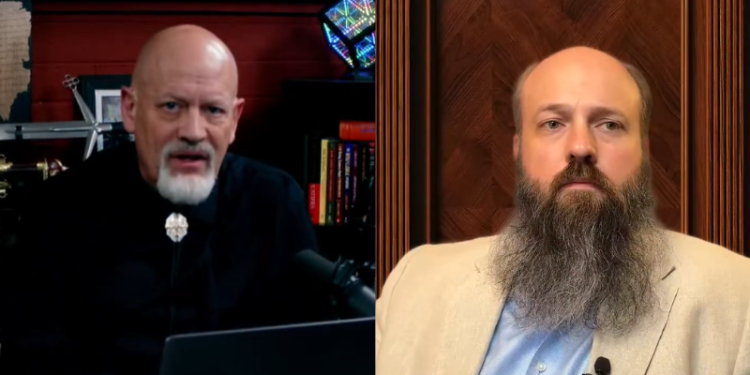In his recent debate with James White on the thesis, “Can the Holy Spirit sanctify a black Christian as much as a white Christian?” Corey Mahler employed the motte-and-bailey fallacy, a rhetorical tactic named after medieval motte-and-bailey castles. This informal fallacy occurs when an arguer merges two related positions: a modest, easily defensible one (the “motte”) and a more contentious, harder-to-justify one (the “bailey”). The arguer promotes the controversial stance but, when faced with pushback, retreats to claiming only the milder position is at stake. By falling back to the motte, the arguer might assert that the bailey remains unchallenged (since the critic avoids attacking the motte) or portray the critic as unfair (by suggesting an attack on the bailey equates to attacking the motte). The motte, for Mahler, consists of several things, including: (1) statistics (today) show more crime among black people than white people, (2) race is “real,” and (3) temporal realities and sins have consequences. The bailey is that the Holy Spirit cannot sanctify the average black person as much as the average white person. If someone critiques Mahler’s bailey, they will be accused of disagreeing with the obvious points (the motte).
Say what you will about James White—whether you admire or dislike him—he adhered to debate protocol, presenting his main arguments on sanctification in his opening statement, complete with scriptural support. Mahler, however, flouted Debate 101: you must deliver your strongest case upfront for the audience’s clarity and for the sake of giving your opponent something to rebut. Mahler omitted his core arguments, including any from Genesis (or anywhere else in the Bible), in his opening, effectively denying White the chance to engage his central (purportedly biblical?) claim about the Holy Spirit’s work and black people’s capacity for sanctification. In fact, Mahler really offered no argument in his opening statement, choosing rather to offer several qualifications for the debate. Mahler cited no Scripture, a telling omission given the thesis on sanctification. This suggests he knew his position lacked exegetical grounding, so he sidestepped biblical arguments altogether. Predictably, White had nothing to rebut—a failure that lies at the feet of Mahler for not offering his argument in relation to the debate thesis during his opening statement. (During Mahler’s second rebuttal period he did reference the Old Testament and how the Jews are characterized “racially” as a “stiff-necked” people.)
Whether you and I like the thesis is irrelevant: the debate’s agreed-upon thesis was the sanctification of a believer, not modern-day societal blessings or current crime statistics. Despite Mahler’s later claims to the contrary, White addressed sanctification directly in his opening, not merely justification, and grounded his case in Scripture. One may dispute White’s conclusions—that’s to be expected in a debate—but he engaged the thesis directly. Mahler, by contrast, dodged the topic and offered no scriptural defense, failing both the audience and the debate’s integrity.
Mahler’s cross-examination further faltered. He opened by questioning White’s views on infant faith, irrelevant to the thesis, and pressed White to affirm the general principle of God’s limitations, a general point White never questioned. Moderators intervened due to Mahler’s off-topic queries, and Mahler inexplicably relinquished three minutes of his first cross-exam and part of his second, squandering chances to advance his case.
I concur with aspects of Mahler’s “motte”: objective metrics, like crime rates, reveal disparities across cultures today, reflecting temporal sins and their consequences. However, the debate’s thesis concerned the sanctification of a white man versus a black man, not the state of cultures, which are fluid and malleable. If Mahler (or anyone) wishes to tie genetics to spiritual capacity, he can take that route, but he must affirm that the gospel can positively transform any people’s spiritual state, including black cultures. One cannot claim a genetic-spiritual link only for condemnation. If spiritual condition interplays with genetics, then it is possible that in 500 years, or 1,500 years, black genetics will be superior to white genetics. I doubt Mahler would affirm this, because his unspoken bailey, absent from the debate, aligns with Patrick Mell’s 1844 claim, echoed in Mahler’s prior talks (e.g., with Samuel Sey), that black people are cursed via Genesis 9’s prophecy on Ham, destined for inferiority (regardless of generations of faithfulness interplaying with “genetics” in the future). Yet Mahler omitted this Genesis argument entirely. To assert black inferiority in sanctification, he needed more than statistics—biblical exegesis was essential. By remaining silent on Genesis 9, Mahler avoided exposing his case to White’s rebuttal (knowing it would crumble under scrutiny?).
Again, our desires for another debate thesis notwithstanding, this debate’s thesis was not about current cultural superiority, or the fact that sin has temporal consequences, but about the Holy Spirit’s power to sanctify a black believer as much as a white believer (hence the debate thesis focused on the singular: “black Christian” versus “white Christian”). Mahler’s refusal to engage the thesis and his decision to refrain from referencing Genesis 9 (central to his position as previously argued), coupled with his reliance on motte-and-bailey tactics, reveals a debater more concerned with rhetorical evasion than biblical fidelity. Mahler’s failure to cite Scripture in his opening statement, particularly his Genesis-based curse claim (which he never brought up), left White without a substantive argument to counter and the audience without clarity on the precise nature of Mahler’s position.
Following the debate, A.D. Robles participated in a discussion on the Bibledingers YouTube channel. Robles had previously expressed some concerns that White “would get emotional” during the debate. But Robles admitted that White did not get emotional, “except during that weird questioning series [which is] totally understandable.” Robles added: “I thought he did a fantastic job with the Bible.” Generally speaking, I concur.

Chris Hume is the host of The Lancaster Patriot Podcast and the author of several books, including Seven Statist Sins. He can be reached at info@thelancasterpatriot.com.





























